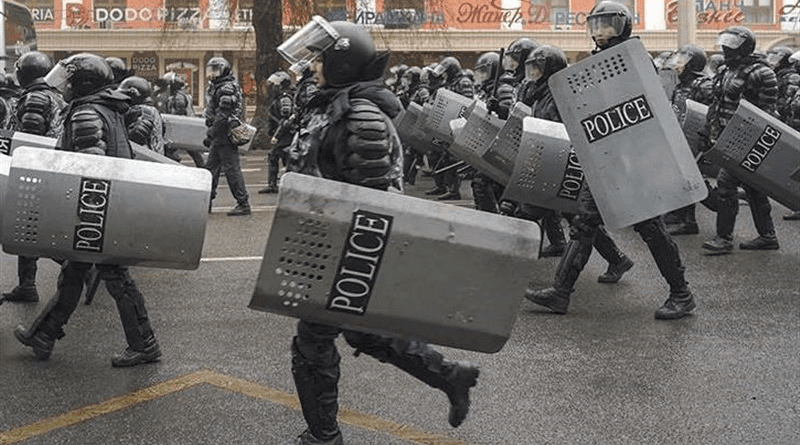Kazakhstan: Protesters Arbitrarily Arrested, Beaten
Kazakhstan security forces have arbitrarily arrested peaceful protesters and others, ill-treated and tortured some detainees, and interfered with detainees’ access to lawyers following nationwide protests in early January 2022, Human Rights Watch said Tuesday.
Human Rights Watch received credible reports of dozens of cases in which police arbitrarily detained peaceful protesters and other people, and subjected some detainees to ill-treatment and torture, including with electric shocks and beatings with batons. Human Rights Watch also documented cases of authorities’ arbitrary interference in the work of lawyers.
“Kazakhstan’s arbitrary detentions of peaceful protests and abuse of detainees is a cause for deep concern,” said Hugh Williamson, Europe and Central Asia director at Human Rights Watch. “Kazakh authorities should immediately put a stop to the abuses, ensure that every detainee’s rights are protected, and bring to justice those who beat or tortured them.”
Between January 11 and 25, Human Rights Watch remotely interviewed 12 people, consisting of six detained on January 3 and 4 in Almaty and then released, five lawyers representing detained activists and protestors in various parts of the country, and a person whose close relative was in pretrial detention and is facing criminal charges of mass rioting. Human Rights Watch also reviewed media reports, information from local human rights defenders, and official government statements.
Reporting and monitoring by Kazakhstan rights groups and independent media complements the Human Rights Watch findings. These groups and reporters documented dozens of other cases of arbitrary detention, and reported on a number of cases of brutal police beatings in custody and law enforcement’s forcible transfer of wounded people from hospitals to various detention facilities.
Media have reported at least two cases of deaths in custody in Almaty, Kazakhstan’s largest city, allegedly as a result of police mistreatment and one such case in Kyzylorda. These violations and abuses seriously undermine efforts to restore public order and the rule of law, Human Rights Watch said.
Kazakh authorities have stated that nearly 10,000 people had been detained across the country in connection with January’s peaceful protests, which later spiraled into unrest and violent clashes with security forces. According to the General Prosecutor’s Office, as of January 25, 898 detainees were facing various criminal charges, including mass rioting and acts of terrorism. Another 63 people already sentenced to detention for administrative offenses remained in custody.
Activists and others interviewed said that police arbitrarily detained them on January 3, before they could reach the protests, and interrogated them for many hours. Six people said they were refused access to the lawyer of their choosing and five were subsequently convicted and sentences to detention for administrative offenses.
A 55-year-old man from Almaty said that on January 3, at around 2 p.m., he was part of a group of people who gathered to support oil workers’ protests in the city of Zhanaozen. “Some people were filming,” he said. “We only walked about 200 meters when OMON [special forces] blocked our way. They were already waiting for us. We had no placards.… We were taken to the police station … there was pressure on us, psychological pressure.”
He said they were not allowed to call their families or get a lawyer of their choosing but were represented by a lawyer on duty. “I was sentenced to 15 days of administrative arrest,” he said.
At least one activist said he had been beaten in custody. Two Almaty-based lawyers also told Human Rights Watch that their clients had been beaten, in some cases to a degree that amounts to torture.
“There were eight people in the cell for six. We slept on the floor,” said the activist who had been beaten. “[Police] insulted us, used foul language against us. I heard people being tortured and beaten … screaming day and night. Every time we left the cell, they beat us. [Police] were forcing [us] to give false confessions. [Police] placed bags on the heads [of some of my cellmates].”
Lawyers told Human Rights Watch that they faced interference while trying to meet with their clients.
An Almaty-based lawyer, Zhanara Balgabayeva, said on January 12 that she did not have access to two of her clients for eight and nine days respectively, and that it was nearly impossible to get any information about the detainees because military officers were guarding police stations and would not let the lawyers enter.
Kazakh authorities should immediately end all arbitrary arrests, including by releasing those still in custody, put a stop to all beatings and mistreatment of detainees, and halt the arbitrary prosecutions of peaceful protestors and activists for the exercise of their civil and political rights. The authorities should ensure that those lawfully detained have their full due process rights, family visits, and adequate medical treatment and that lawyers do not face arbitrary interference in their professional work.
The Kazakh government should ensure that allegations of human rights abuses, including arbitrary detention, ill-treatment and torture, deaths in custody and unlawful killings, are promptly, independently, and effectively investigated, and that anyone responsible for abuses is held to account, Human Rights Watch said. They should also allow and facilitate national and international human rights groups to monitor the situation of people detained during the January protests and unrest.
Kazakhstan’s international partners should urge the government to urgently take these steps. Should Kazakhstan fail to take action, the European Union, its member states, the United States, and other partners should seek an international investigation into the January events, including the treatment of detainees and excessive use of force by security forces.
“For many years Kazakhstan has had a reputation for banning protests and detaining and beating peaceful protesters,” Williamson said. “The government should use this crisis to fundamentally change its approach – by allowing peaceful assembly and making clear that beatings and torture in detention will not be tolerated.”

